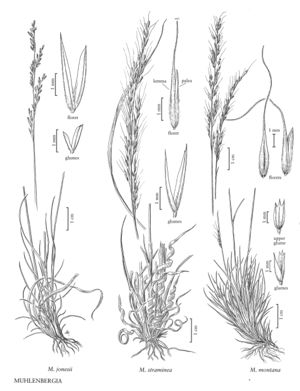Difference between revisions of "Muhlenbergia jonesii"
imported>Volume Importer |
imported>Volume Importer |
||
| Line 43: | Line 43: | ||
|publication year= | |publication year= | ||
|special status=Endemic | |special status=Endemic | ||
| − | |source xml=https://bitbucket.org/aafc-mbb/fna-data-curation/src/ | + | |source xml=https://bitbucket.org/aafc-mbb/fna-data-curation/src/200273ad09963decb8fc72550212de541d86569d/coarse_grained_fna_xml/V25/V25_758.xml |
|subfamily=Poaceae subfam. Chloridoideae | |subfamily=Poaceae subfam. Chloridoideae | ||
|tribe=Poaceae tribe Cynodonteae | |tribe=Poaceae tribe Cynodonteae | ||
Latest revision as of 17:58, 11 May 2021
Plants perennial; tightly cespitose, not rhizomatous. Culms 18-50 cm, erect, rounded near the base; internodes glabrous. Sheaths glabrous, bases becoming flattened and papery, lower sheaths longer than the internodes; ligules 2-5 mm, membranous, acute to acuminate; blades (5)6-12 cm long, 1-2.5 mm wide, flat, becoming loosely involute to subfiliform, scabrous abaxially, hirsute adaxially, apices not sharp. Panicles 4-15 cm long, 1.5-4 cm wide, not dense; primary branches 0.5-5 cm, appressed or diverging up to 40° from the rachises; pedicels 0.5-6 mm, flattened, scabrous. Spikelets 2.8-3.5 mm. Glumes subequal, 0.6-1.8 mm, scabridulous distally, truncate to obtuse, unawned; lower glumes 1-veined; upper glumes 3-veined, 3-toothed, often erose; lemmas 2.8-3.5 mm, lanceolate, loosely pubescent on the basal 1/3 of the midveins and margins, hairs to 0.6 mm, apices scabridulous, acute, mucronate, mucros shorter than 1 mm; paleas 2.8-3.5 mm, lanceolate, acute; anthers 1.4-2.3 mm, purple. Caryopses 1.6-1.8 mm, fusiform, light brown. 2n = 20.
Discussion
Muhlenbergia jonesii is endemic to northern California. It grows on open slopes, pumice flats, and in openings in pine forests, at elevations of 1130-2130 m.
Selected References
None.
